Education is beyond the simple transmission of knowledge; it fundamentally seeks to foster students’ capacity for self-directed learning. For over three decades, the Faculty of Education (FED) at the University of Macau (UM) has continuously refined its teaching and research initiatives in order to train professional educators. As a result, FED has cultivated successive generations of educators skilled in meeting the ever-changing demands of society. The faculty has proactively expanded its curriculum in recent years to address the needs of Macao and neighbouring regions.
Evolving educational programmes
Teacher training in Macao’s higher education institutions began in 1987, when the University of East Asia (UEA), the predecessor of UM, introduced the first professional training course for 62 primary school and kindergarten teachers. In 1989, the university established the School of Education, which was later renamed the Faculty of Education, and unveiled a four-year Bachelor of Education programme. Fast forward to the present day, and the faculty has educated over 5,000 individuals and offers an array of 18 programmes, spanning bachelor’s, master’s, doctoral, and postgraduate certificate programmes. In the 2023 Times Higher Education World University Rankings, UM ranks in the 101–125 band in the field of education and sits among the top 10 teacher education programmes in the Greater China region.
FED consistently broadens its teaching areas to address the evolving challenges of our time, including those posed by artificial intelligence and the growing societal focus on youth mental health. In recent years, the faculty has launched several new programmes. These include the Bachelor of Education (Integrated Science) degree, a specialisation in Analytics in Teaching and Learning within UM’s Master of Science in Data Science programme, and a Doctor of Education degree programme. This doctorate integrates professional and practical approaches, with the aim of developing talent in educational management. It targets principals and vice-principals of primary and secondary schools, as well as education officials. Additionally, FED actively collaborates on an array of teacher and mid-to-senior level leadership training programmes organised by the Macao Education and Youth Development Bureau (DSEDJ), as well as other training initiatives focused on educational technology.
To broaden the horizons of future educators, FED is planning a collaborative bachelor’s degree programme in mathematics education with East China Normal University, and is discussing a similar programme in Chinese education with Beijing Normal University. Additionally, the faculty is forging a joint educational initiative with the University of North Carolina at Charlotte. FED also intends to introduce an applied master’s programme focused on Teaching English as a Second Language (TESL). In addition, the faculty offers a range of professional training courses for a considerable number of in-service teachers and conducts teaching assessments for schools. These multi-faceted efforts collectively strive to raise educational standards in Macao.
Developing practical skills
In response to societal needs, FED has, in recent years, vigorously promoted inquiry-based interdisciplinary STEM education, commonly known as iSTEM. Prof Emily Oon, director of the faculty’s Educational Research Centre, explains, ’Cultivating innovation in primary and secondary school pupils is only possible when teachers are innovative. Only with innovation can teachers design effective STEM learning activities.’
Prof Oon, a former secondary school Physics teacher, knows clearly how important it is for iSTEM teachers to have an inquisitive mindset and be proficient in assessing teaching effectiveness. Since 2020, the faculty has collaborated with the Macao SAR government to co-run iSTEM teacher training courses and has partnered with in-service teachers to study how to make Macao’s iSTEM curriculum more systematic and effective. ‘Designing new curricula and developing novel teaching materials are no simple tasks,’ Prof Oon acknowledges. ‘But as teachers, there’s nothing quite like the satisfaction we feel when our students grasp real-life challenges and uncover their own solutions.’
Jarret Huang, a 2023 graduate of the Bachelor of Education (Integrated Science) programme, started his role as an iSTEM teacher at a secondary school in Macao in September. ‘There have been many educational kits on the market which simply direct students to complete tasks with step-by-step instructions. This approach doesn’t align with the essence of iSTEM education,’ says Huang. ‘Prof Oon encourages us to guide students to integrate knowledge from various disciplines to undertake scientific inquiries and apply these skills to daily challenges. iSTEM is not merely about coding or building robots.’
All FED undergraduate and postgraduate certificate students are required to complete an internship before graduation. They must submit their lesson plans for professorial review for their internship, and professors also observe their classes to provide feedback. Huang completed a semester-long internship at the Premier School Affiliated to Hou Kong Middle School during his fourth year. Now, after four years of studies at UM, he has the ability to teach in both Chinese and English, enabling him to work in diverse educational settings and seize potential opportunities. ‘UM allowed me to gain a deep understanding of science education within an international framework and equipped me with the skills to guide students to explore the world through innovative technologies,’ Huang asserts.
A student-centred curriculum
During an interview at his sports science lab, Prof Kong Zhaowei, associate dean (teaching) of FED and an experienced researcher in physical education, shares his belief about education. ‘As educators, our role extends beyond merely imparting knowledge; we must also address the doubts and concerns of our students. Therefore, students are the protagonists in the classroom, and teachers should regard themselves as students’ committed supporters. This belief reminds us to always prioritise the needs of our students when designing curriculum. For example, we sometimes employ the “flipped classroom” approach to enhance students’ learning experience. We encourage students to preview the teaching contents prior to class before we engage them in discussion during class.’
Undergraduate education in FED centres on the integration of theory and practice. Carefully arranged teaching internships, individualised internship supervision, and comprehensive evaluations ensure that graduates possess a genuine passion for teaching, robust professional knowledge, versatile skills, good communication abilities, and strong team spirit. Meanwhile, the faculty’s postgraduate programmes aim to cultivate the practical and research skills of high-calibre talent in education. By exposing students to the latest trends and technologies in the global educational landscape, the faculty further strengthens their competitive edge for future career and academic pursuits.
Graduates cultivating talent
Studying education provides FED graduates with plenty of job opportunities. Many of them proceed to roles as teachers, counsellors, or administrators in various educational settings across Macao after graduation. Others use the theories and knowledge they have acquired at UM to contribute to education departments in the government and social service organisations. Carol Wong, a 2020 graduate with a passion for music and a former member of the UM String Orchestra, recalls, ‘During my time at UM, one of the most inspiring classes I had was about classroom management. My professor, Elizabeth Hsiang, who has rich experience in primary education, offered invaluable real-world teaching examples. The significance of the lessons struck me even more when I started teaching during my internship and my full-time teaching job. I grasped the importance of dedicating time to build a good rapport with students, whilst laying down clear rules. It’s a nuanced balance, but one vital for effective teaching.’
When Wong was still a university student, she participated in a half-year exchange programme about music and visual arts at The Education University of Hong Kong, in addition to her teaching internship in Macao. These opportunities enabled her to integrate theory with practice, better preparing her for a career in education. ‘Many of my students may not follow a musical path in the future, but that in no way negates the essential value of music education,’ she says, ’When students interact with beautiful music, they can feel the beauty in it, which then allows them to learn to feel the beauty in our everyday life. Prof Dennis Wang once told me that happy teachers make happy students, for emotions are infectious. So, I always stay positive. I influence my students with my good vibes so that together we can discover the beauty life presents.’
A graduate of the Bachelor of Education (Secondary Education – Chinese) programme, Lilian Kwong is now the assistant principal at Xin Hua Evening Secondary School. She believes that a teacher’s personal growth is a continuous journey. She says, ‘FED professors come from different parts of the world, offering students exposure to the most current teaching philosophies and methods from different places. In my very first class at university, Prof Lou Chi Kuan emphasised that as future educators, and as students of FED, we can’t emphasise enough the importance of being punctual and strict with ourselves. That lesson has stayed with me, and I’ve required myself to follow these ever since. I am never late for class.’
When interacting with students from diverse backgrounds, Kwong employs a variety of teaching methods. ‘My aim is to weave current events into classroom learning whenever feasible. For instance, I arranged my students to meet with lawmakers when I was teaching proposal writing. This approach not only familiarised my students with the mechanics of writing proposals to the government but also broadened their societal awareness.’ Kwong’s passion for teaching and her conscientiousness have won her the ‘Distinguished Teacher’ award for the 2017/2018 academic year from Macao’s Education and Youth Affairs Bureau (now known as the Education and Youth Development Bureau).
Since graduating from FED in 2009, Kwong has worked in the education sector for 14 years, during which she has maintained close contact with the faculty. ‘The Faculty of Education at UM serves as the main institution for teacher training in Macao,’ says Kwong. ‘Our school has invited professors from UM to deliver specialised training sessions that cover a range of topics, from adult teaching methodologies to the Constitution and the Basic Law. Additionally, I have taken part in the leadership training courses for middle and senior school management organised by the DSEDJ in collaboration with the faculty. Combining both theory and practice, the courses have been very beneficial.’
Improving teaching through research
FED not only emphasises teaching but also actively encourages its faculty to engage in academic research to enrich pedagogical practices. Currently, it has several research centres, including the Educational Research Centre, the Educational Testing and Assessment Research Centre, the Centre for Information & Communication Technology in Education, and the Centre for Early Childhood Education and Child Development.
Zhou Mingming, associate dean (research) of FED, highlights the co-existence of Eastern and Western educational systems in Macao, which offers a valuable comparative research perspective that benefits the nearly 60 faculty members in FED. ‘Our research focuses on several key areas, such as educational psychology, educational technology, teaching and learning, and educational measurement and assessment,’ she says. ‘We actively collaborate with schools, government departments, and educational organisations to apply our findings to Macao’s education system. For instance, in 2022, we developed an assessment tool specifically tailored for primary and secondary schools in Macao. This tool aims to track the development of non-cognitive attitudes among students of various ages and grades.’
Prof Zhou also emphasises the faculty’s growing focus on interdisciplinary research, which involves not only faculty members but also postgraduate students. ‘For example, students enrolled in our PhD in Education programme have the option to select an additional supervisor from other faculties or research institutes within UM, thereby accessing the interdisciplinary knowledge necessary for their research,’ she notes. ‘Furthermore, we have seen an uptick in collaborations between our researchers and data science experts or enterprises, which allows researchers to gather education-related data from diverse sources and utilise artificial intelligence technologies, such as natural language processing, to analyse the data. Such collaborations complement traditional research methodologies, enriching our overall understanding of educational dynamics,’ she explains.
Contributing to the education sector
In an era marked by swift technological advances and social changes, traditional teaching methods are increasingly under scrutiny. Nevertheless, FED remains steadfast in its strategic aims, continuing to distinguish itself as a leading centre for teacher training and impactful educational research. It is committed to nurturing educators adept at confronting future challenges, not only in Macao and across China but also globally, as well as bringing enduring and meaningful transformation for both society and its students.
Chinese & English: Davis Ip, UM Reporters Silvia Zhou & Zhang Fangbo
Photo: Ella Cheong, UM Reporters Ye Haoqi, Victor Lam & Harry Chen, and the Editorial Board
Source: My UM ISSUE 127
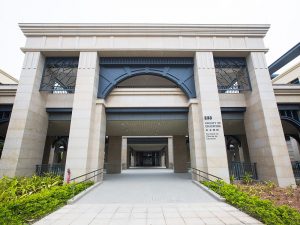
The Faculty of Education of UM
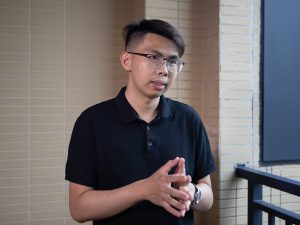
Jarret Huang
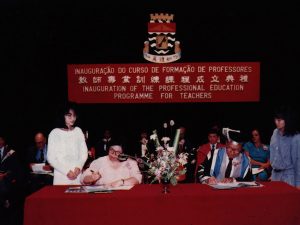
In 1987, the University of East Asia, the predecessor of UM, launched its first teacher training programme
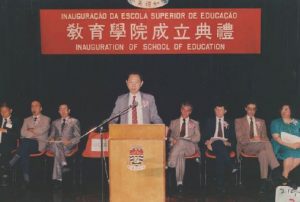
In 1989, the School of Education (now Faculty of Education) was established at the University of East Asia (now UM)
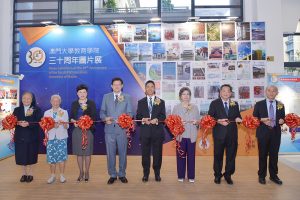
FED celebrated its 30th anniversary in 2019
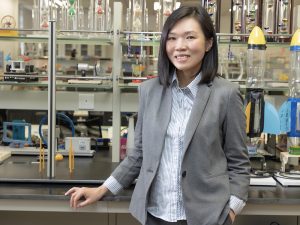
Prof Emily Oon
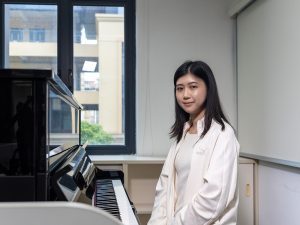
Carol Wong
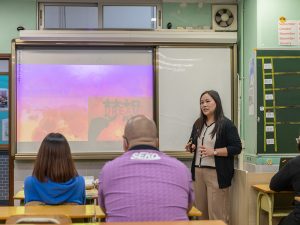
Lilian Kwong
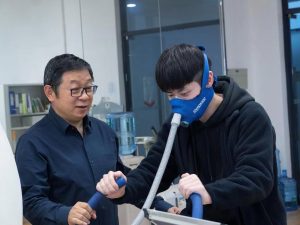
Prof Kong Zhaowei
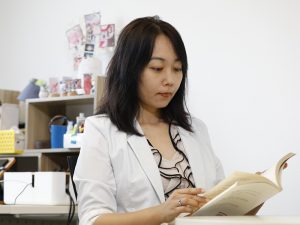
Prof Zhou Mingming
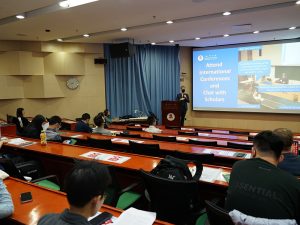
The Faculty of Education 2023 Postgraduate Research Symposium
